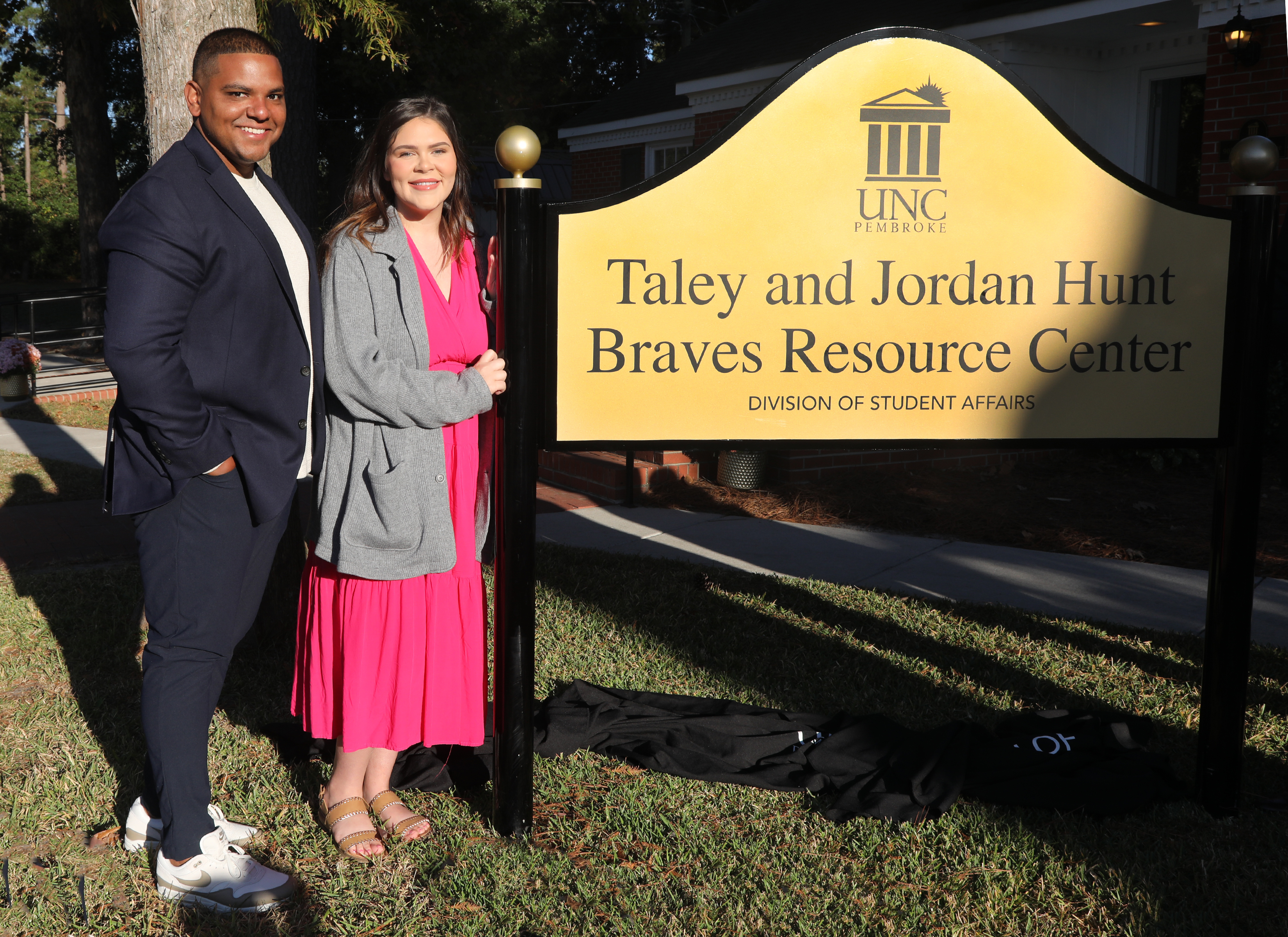CARE Team
Who is the CARE Team?

How We Help
- We identify and support you if you're struggling with concerning behavior or challenges.
- We work with campus and community resources to get you the help you need.
- We educate the campus community on recognizing and reporting concerns, ensuring early support is available.
- We track concerns and behaviors to prevent situations from escalating so you can focus on your goals.

When to Contact Us
Knowing when to reach out is the first step to finding support. If you're unsure how to handle a difficult situation or feel overwhelmed, the CARE Team is here for you. If you know someone struggling and believe they need our assistance, please contact us at 910.775.4180
Note: If you are experiencing an emergency, please call UNC Pembroke Police and Public Safety at 910.521.6235 for on-campus emergencies or 911 for off-campus emergencies.
Navigating CARE Resources

Taley and Jordan Hunt Braves Resource Center
The Braves Resource Center is your one-stop destination for comprehensive support and resources to address your basic needs and enhance your overall well-being.
Some of our services include:
- On-Campus Pantry
- Financial Assistance
- Coordination of resources and services
- SNAP Application Support
- One-on-one Mentoring with Basic Needs Peer Mentors

Braves Asset Map
Are you looking for off-campus support? The Braves Asset map features resources and services in North Carolina that address individual needs. The resources and services include:
- Emergency Medical Services
- Transportation Services
- Substance Use Disorder Treatment Services
- Child Care Services
- Food Pantries
- Homeless Shelters and Services
- Domestic Violence Shelters and Services
- Sexual Assault Resources
- Public Safety and Security Resources
- Specialized Medical Care Facilities
- Mental Health Care Services
- Wellness Resources and Services
CARE Team FAQs
The CARE Team comprises subject-matter experts from various campus departments dedicated to helping students of concern remain successful in and out of the classroom. CARE Team members have experience in law enforcement, threat assessment, physical and mental health, human resources, housing and residence life, university operations and student affairs.
Anyone is welcome to submit a CARE referral. Those submitting a report are often faculty, staff, students or parents. A CARE referral should NOT be used for emergencies. If you are experiencing an emergency, please call UNC Pembroke Police and Public Safety at 910.521.6235 for on-campus emergencies or 911 for off-campus emergencies.
Anyone can report concerning, disruptive or threatening behaviors to the CARE Team by submitting a CARE referral using the online reporting form.
Reports can be submitted anonymously. However, we prefer to have the reporter's contact information to follow up, gather additional information, etc.
All university community members are essential in helping others get the assistance they need to succeed. There may be signs indicating that a person is experiencing personal challenges and would benefit from support.
Examples of the types of behaviors sometimes exhibited by distressed individuals that should be referred to the CARE Team include:
- Extreme anxiety
- Prolonged and significant difficulty with the demands of college
- Tearfulness, frequent crying
- Loss of temper or outbursts of anger
- Destructive behavior, including self-injurious behavior
- Displays of physical and/or domestic violence
- Expressions of self-blame, guilt or shame
- Extreme sadness or depression
- Deteriorating classroom performance
- Disruptiveness, overly confrontational, aggression with disregard for others
- Impulsiveness without giving thought to the consequences of actions
- Withdrawing from or avoiding others, isolating
- Expressionless face
- References to suicide, along with statements of hopelessness and helplessness
- Speaking or writing that is violent, seems bizarre or is out of touch with reality.
- Violent fantasy content, expression of dark or jarring themes or images
- Fascination with weapons
- Homicidal ideation
- Stalking
- Non-compliance or disciplinary matters
- Interest in previous shooting situations
- Victim/martyr self-concept, allusions of grandeur
- Paranoia
- Violence or cruelty
- Recent police contact
- Unusual interest in police, military, terrorist activities and materials
- Excessive use of drugs and/or alcohol
- Recent and dramatic life changes, including changes in personality, eating habits, hygiene/appearance and/or sleep patterns
- Publishing a video or communicating a plan of harm to self or others
Presentation of these behaviors in isolation may or may not indicate a more serious problem. Sharing information with the CARE Team may assist in analyzing a pattern of behaviors that may benefit from intervention and support.
The behavior of distressed individuals may come to your attention in a variety of ways, including:
- Direct observation of the behavior in the classroom, including in written form through assignments
- Direct observation of the behavior outside of the classroom, including such places as the residence halls, library, cafeteria or student activities and events
- Reports regarding online or social media platforms via posts, blog entries, Tweets, etc.
- Reports from other students, roommates, faculty, staff or other members of the university community, including family members
- Direct communication with the individual via in-person conversations, email or phone calls/messages
Keep in Mind:
- Even with a CARE Team, this team's actions and responsibilities differ from those of emergency responders or the police. Some behaviors require immediate emergency assistance. If an incident is an immediate threat to self or others, please contact UNC Pembroke Police and Public Safety at 910.521.6235 for on-campus emergencies or 911 for off-campus emergencies .
- The list of behaviors provided is not exhaustive or inclusive of all behaviors that should be reported but is intended to be a useful educational resource or guide.
You do not have to make this determination; the CARE Team will do it for you. The most crucial step is to report your concern to the CARE Team by submitting a CARE referral form. If another campus resource is more appropriate, the CARE Team will refer the student and coordinate continuity of care and proper case management documentation.
When a CARE referral is submitted, the CARE Team decides upon the most appropriate person to contact a student of concern. This can often be accomplished without mentioning the details of the CARE referral. Sometimes, a student will be asked to meet directly with the case manager of the CARE Team or another member of the CARE Team.
The CARE Team seeks to connect students to the department(s) that will provide the best resource(s). Trainers review CARE referrals during normal business hours to assess and act. The CARE Team case manager conducts an initial assessment of every CARE referral. In many cases, the outcome of the initial assessment is to offer support and resources to either the individual who reports the concern, the student of concern or both. Each situation is different and requires an individualized approach.
The CARE Team often collaborates with the reporting party and other campus and community resources if appropriate. The reporting party will be informed, as applicable, of the situation concerning the privacy of all parties involved. While maintaining privacy is the CARE Team's goal, please be aware that reports and other communication may be subject to review as outlined in federal and state laws.
The CARE Team will make every effort to get back to you; however, we must maintain the student's privacy-specific laws that may keep us from sharing details about our follow-up with you.
Only CARE Team members know the names of students of concern and are given details relevant to effectively supporting these students. If you submit a CARE referral regarding a student already identified to the CARE Team, your information will be added to the previously existing CARE referral(s). Each CARE referral provides a unique perspective that is likely to assist in identifying the most appropriate resource and support strategy for each student.
Upon pressing "submit," you will be redirected to a page that will thank you for your submission. If you do not receive this message, please contact the CARE Team case manager to report the problem. In certain circumstances, you may be contacted to provide additional information about your referral. If you have not been contacted and received the submission message, rest assured that your report will be reviewed and acted upon. If you want an update on the student to whom you submitted a CARE referral, please contact the CARE Team case manager coordinator at 910.775.4180 . However, we must maintain the student's privacy; some laws may keep us from sharing details about our follow-up with you.
Yes. A CARE referral can be submitted for any student (graduate or undergraduate) at UNC Pembroke.
The CARE Team's mission is to provide proactive and supportive consultation, assessment, response and education. It does not address disciplinary issues or mete out sanctions.
We can never promise confidentiality when safety is an issue, but we will try to treat each case with discretion and privacy. University officials may be required to report situations involving threats to safety. Although you can submit a CARE referral and request anonymity, it is important to note students may realize you submitted a CARE referral through less direct ways (i.e., details related to that incident, information only shared by the student with one person on campus).
Members of the CARE Team are available to provide education, resources and training to UNC Pembroke students, staff and faculty. Departments, clubs, organizations, teams and others are encouraged to request our consultation and training services.
What to Expect
Your initial appointment with a member of the CARE case management team may last approximately 30 minutes. Depending on the situation, we will explore concerns related to psychological, physical and emotional health, academic achievement and financial circumstances in an effort to identify areas of need and options for support.
Follow-up or check-in appointments are a way for you to remain connected with CARE to discuss your connection to resources, academic progress, and wellness goals. Follow-up appointments are often conducted in-person, however, you may also arrange to check-in by phone or email.
- Provide support when life challenges get in the way of educational performance and goals
- Help communicate with faculty and staff during times of unexpected family or personal crisis
- Improve study skills and connect with academic support systems
- Help navigate leave and readmission process if voluntary or medical withdrawal is required
- Connect with support services such as the Counseling and Psychological Services Center and Campus Recreation
- Provide support, referrals and care coordination during times of crisis
- Provide support during periods of inpatient hospital treatment
- Support navigation of on and off campus resources and services
- Support social connection and sense of belonging
- Create balance between work and life
- Help discover strategies to foster wellness and success
- Explore choices around alcohol and other drugs
- Help families understand support resources available on and off campus
- Connect with financial aid office to explore financial resources and support services
- Connect with career center to explore employment opportunities
- Connect with Accessibility and Resource Center (ARC) that provides, arranges, and coordinates accommodations for students in courses, programs, services, activities, and facilities
UNC Pembroke's Counseling and Psychological Services Center (CAPS) provides ongoing therapy, skill building and consultation. While there is some overlap in consultation services, case management helps with short-term planning and coordination of care. CAPS is a confidential source: information remains with the student and CAPS. Case managers work as a private source: they are obligated to report known names and facts to Title IX coordinator.
Case management is not therapy or counseling so the rules of confidentiality that might apply to medical or mental health treatment are not the same. With the exception of a crisis situation, the case manager shares information with campus colleagues about student behavior when there is a legitimate educational interest. It is important that students understand that CARE Team case managers are mandatory reporters. Therefore, if a student discusses a Title IX related matter or other abuse, the issue will be reported accordingly.
Our Dedicated CARE Team


Contact Us
If you have any questions, please contact us.
CARE Team
University Center Annex Room 221
PO Box 1510
Pembroke, NC 28372
Phone: 910.775.4180
Fax: 910.521.6272
